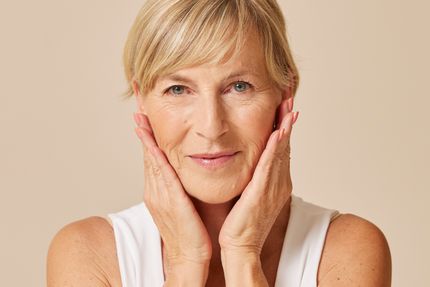Hot flashes and menopause
Fluctuating oestrogen levels can disrupt your body's temperature regulation and cause acute bouts of excessive sweating. Or you may experience shivering and chills. Hot flashes are a typical menopausal symptom and they can be really distressing. Let's face it, hot flashes are no joke, and they often come at inconvenient times. Hot flashes usually last a few minutes. What can help? Breathe calmly. Put your hands on your belly and breathe deep into the stomach. Breathe in through your nose, and out through your mouth.

Those random sweat attacks are really horrible and embarrassing. Sometimes I have several an hour. - Johanna (age 56)

More than 80 percent of women experience hot flashes to some degree, especially during perimenopause. Most women stop having hot flashes gradually after their periods stop. But for some women, they last a lot longer. One thing is certain, those pesky hot flashes will stop eventually. Five percent of unlucky women, however, still experience hot flashes 10 years after they hit menopause. Are you among the unlucky ones? Then talk to a doctor.
How often hot flashes occur and how severe they are varies among women. Some feel like dunking their head in a bucket of ice water, while others breathe their way through them with ease. Also, the frequency varies from person to person: from occasional attacks in a week to once every hour. Whatever the intensity and duration of your hot flashes, they are still extremely bothersome – especially if yours happen at inconvenient moments. We’ve all been there...
What is happening in your body?
During the menopausal transition, levels of oestrogen and progesterone in the body start to fluctuate and decline. These sex hormones have all kinds of functions, including regulating your body temperature. Oestrogen, in particular, plays an important role in this respect. When oestrogen levels drop, your brain gets a signal that you're too hot. Even when you're not.
Reduced oestrogen levels cause elevated levels of the stress hormone noradrenaline, which initiates an intense cooling response. This causes your blood vessels to widen, you to start sweating profusely and your face to turn red. It’s as if your inner thermometer is stuck at 35 degrees Celsius. The opposite can happen, too: you feel cold and start shivering. It's like being in a freezer! That's what a hot flash feels like.
Actually, the process is similar to your menstrual cycle. When you have your period, your oestrogen level drops and your body temperate goes down. When you ovulate and oestrogen increases, your body temperature rises. During menopause, the same temperature changes occur, only more severe.
Other causes
In addition, stress and tension are also known to trigger hot flashes (as well as other menopausal symptoms). When you're busy and in a constant state of being reactive, your cortisol levels rise. Increased cortisol levels impact the production of oestrogen. Therefore, women with a hectic lifestyle tend to get more hot flashes than those with a less busy lifestyle. Do you get hot flashes at night? Then they are called night sweats.
By the way, most women have multiple menopausal symptoms. So, it’s not uncommon to also have mood swings, low energy or muscle pain.
What can you do?
- When a hot flash strikes, your first reaction can be to start fanning yourself. This may provide temporary relief, but it doesn’t make it stop. What can you do that works better? Focus on your breathing. Breathe in slowly through your nose and exhale through your mouth to reduce the level of cortisol in your blood. Your hot flash will then slowly disappear.
- Avoid stress, sugar, spicy foods, alcohol, coffee and other caffeinated products, and quit smoking. These products or habits disrupt your body temperature, which can trigger or worsen hot flashes.
- Stay physically active. Doing medium-impact sports, such as jogging, CrossFit workouts or swimming, has proven to be helpful in reducing hot flashes. Make sure you drink cool water during your workout. It is also recommended that you exercise in the morning to prevent night sweats.
- Drink plenty of water throughout the day. When you experience a hot flash, you lose a lot of body fluids.

Managing hot flashes with medication
Are your symptoms hindering your daily life? There are hormonal as well as non-hormonal medications for hot flashes.

What treatment is right for you?
What can you do if you continue to suffer from hot flashes despite exercising regularly and living a healthy, stress-free life?
Hormone therapy for relief of hot flashes
Hot flashes are a typical symptom of menopause. They are related to fluctuating hormones and can happen before, during and after menopause. Hormone therapy involves the administration of oestrogen and progesterone to restore balance in the body and thus alleviate symptoms such as hot flashes, often within a few days.
According to experts, it’s the most effective treatment for hot flashes and night sweats. What form of hormone therapy is right for you depends on your symptoms, medical history and what menopause stage you are in. Options include Progynova and Trisequens.

It took a while to get the dose right, but now that I've got it, it's great. My hot flashes are virtually gone.- Jet (age 48)

Sources
- Kroenke, Candyce H. ScD, MPH; Caan, Bette J. DrPH; Stefanick, Marcia L. PhD; Anderson, Garnet PhD; Brzyski,https://bmcwomenshealth.biomedcentral.com/articles/10.1186/s12905-021-01433-y
- PhD; Johnson, Karen C. MD, MPH; LeBlanc, Erin MD, MPH; Lee, Cathy MD; La Croix, Andrea Z. PhD; Park, Hannah Lui PhD; Sims, Stacy T. PhD; Vitolins, Mara DrPH; Wallace, Robert MD, MS. (2012). Effects of a dietary intervention and weight change on vasomotor symptoms in the Women’s Health Initiative.
- Freeman EW, Sammel MD, Lin H, Liu Z, Gracia CR. (2011). Duration of menopausal hot flushes and associated risk factors. PMID: 21508748.
- Bansal R, Aggarwal N. (2019). Menopausal Hot Flashes: A Concise Review. PMID: 31001050.
- Zhou, Q., Wang, B., Hua, Q. et al. (2021). Investigation of the relationship between hot flashes, sweating and sleep quality in perimenopausal and postmenopausal women: the mediating effect of anxiety and depression. https://bmcwomenshealth.biomedcentral.com/articles/10.1186/s12905-021-01433-y.
- Ferrari N. (2020). Menopause-related hot flashes and night sweats can last for years. https://www.health.harvard.edu/blog/menopause-related-hot-flashes-night-sweats-can-last-years-201502237745.
- MacLennan A, Lester S, Moore V. (2001). Oral oestrogen replacement therapy versus placebo for hot flushes. PMID: 11279791.
- NHG-werkgroep: Blom JW, De Vries CJ, Eekhof H, Engel HF, Hoenjet E, Janssen CA, Schep A, Stevens NT, Van den Donk M, Wiersma Tj, Woudstra SJ. (2024). De overgang. https://richtlijnen.nhg.org/standaarden/de-overgang
KNMP. (2023). Clonidine https://www.apotheek.nl/medicijnen/clonidine
Your path to a smooth menopause starts here
Get the tools you need to navigate menopause with more ease and to educate yourself about your body. With tips and insights from experts, and relatable stories of women just like you. Press play, not pause.
Tips and advice


FAQ
What should a woman do if she has hot flashes?
When you are overcome by a hot flash, you tend to literally fan it away. This is not helpful. What does help is to calmly pay attention to your breathing. Try 4-7-8 breathing: breathe in through your nose while counting to 4, hold your breath, count to 7 and breathe out through your mouth while counting to 8. Calm breathing stabilises the nervous system and reduces hot flashes.












